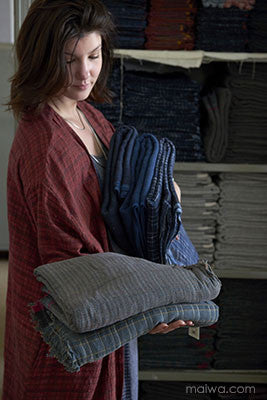
The Indian city of Maheshwar is fabled for two things: strong female rulers and exceptionally beautiful weaving. These two elements came together with Ahilyabhai Holkar (1725-1795) a woman who is still known today as the “Philosopher Queen of Malwa” and who was even praised by her British opponents as “one of the purest and most exemplary rulers that ever existed.” Ahilyabhai was also a great patron of the arts. It was she who brought weavers to Maheshwar from as far away as Surat (on India’s western coast) to produce a special nine-yard sari. The skillfully woven combination of silk and cotton has since become known as “Maheshwari.”


Today
Sally Holkar continues the tradition of promoting handloom artisans and weaving. In 1978 Sally co-founded the Rehwa Society to promote Maheshwari weaving and encourage women to take up the craft. In 2003, looking to inspire contemporary alternative to Maheshwari fabric, Sally founded
WomenWeave. As she put it: “I want handloom to rise again like a phoenix. I can only explain it with the simile of fusion cuisine—mixing Thai with Mediterranean and French. You come up with something new.”
WomenWeave works toward making handloom a profitable, fulfilling, sustainable and dignified income-earning activity particularly for women in rural areas of India.
Maiwa collaborates with WomenWeave to produce a line of naturally dyed handloom scarves and a line of running fabric that we use in our clothing. Maiwa also supports WomenWeave by carrying select items from the WomenWeave line.
WomenWeave operates a spinning centre known as Gudi Mudi (a term which means “scrunched” in the local language). Gudi Mudi skills highly marginalized women in the spinning and weaving of locally grown cotton. Across the street is WomenWeave. On the cool, open terraced floor, handlooms are everywhere. Surprisingly for a second storey location, there is a packed earth floor. Bobbin winding takes place under the awnings, pressing in one corner and drumming of the warps in another.
On one side of a grass-filled courtyard are sample looms, and looms set aside for training. The entire atmosphere is one of studious production, evaluation, and experiment. It is exactly what one might expect from the Holkar tradition of inspiring and supporting artisan work.








